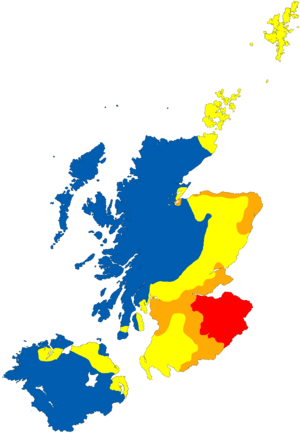Scots facts for kids
Quick facts for kids Scots |
|
|---|---|
| (Braid) Scots, Lallans, Doric | |
| Native to | United Kingdom, Republic of Ireland |
| Region | Scotland: Scottish Lowlands, Northern Isles, Caithness, Arran and Campbeltown Ulster: Counties Down, Antrim, Derry and Donegal |
| Native speakers | 100,000 (1999) 1.5 million L2 speakers Total: 17% to 85% of the Scottish population speak it to some degree |
| Language family | |
| Early forms: |
Early Scots
|
| Official status | |
| Official language in | None — Classified as a "traditional language" by the Scottish Government. — Classified as a "regional or minority language" under the European Charter for Regional or Minority Languages, ratified by the United Kingdom in 2001. — Classified as a "traditional language" by The North/South Language Body |
| Recognised minority language in | |
Scots is a West Germanic language. It is sometimes called Lowland Scots or Lallans. It is not Scottish English but it is similar to the English spoken in Scotland. Ulster Scots is a special form of Scots found in the north of Ireland. Scots is very different from the Scottish Gaelic language, which is a Celtic language.
Some people debate if Scots is a separate language or a type of English. It is generally seen as one of the old forms of English. Scots also has its own unique types, like Doric.
The Story of Scots: How it Grew

Scots started to develop in southeastern Scotland around the 1100s and 1200s. This area was once part of an old kingdom called Northumbria. People speaking an early form of English, influenced by Norse, moved there from northern England.
Over time, other languages also influenced Scots. Words came from Latin, which was used in churches and for laws. Norman and French words came from the "Auld Alliance" (a friendship between Scotland and France). Words from Dutch and Middle Low German came through trade and people moving from the Low Countries. Scots also borrowed words from Gaelic.
From the 1200s, Early Scots spread across Scotland. This happened as King David I created new towns called burghs. By the 1300s, Scots became the main language in most of eastern Scotland. This was because it grew in importance, and French became less common in Scotland.
Between 1610 and the 1690s, many Scots-speaking people moved to Ulster in Ireland. About 200,000 Lowlanders settled there. In some areas, there were many more Scots speakers than English speakers. After 1700, a more standard form of English became popular for writing. The Scots spoken after 1700 is sometimes called "Modern Scots."
Related pages

